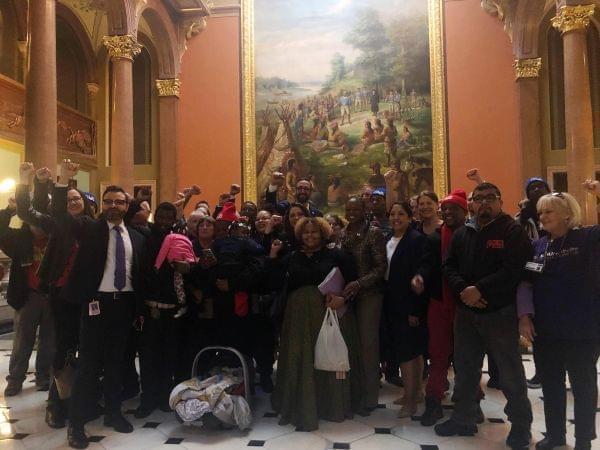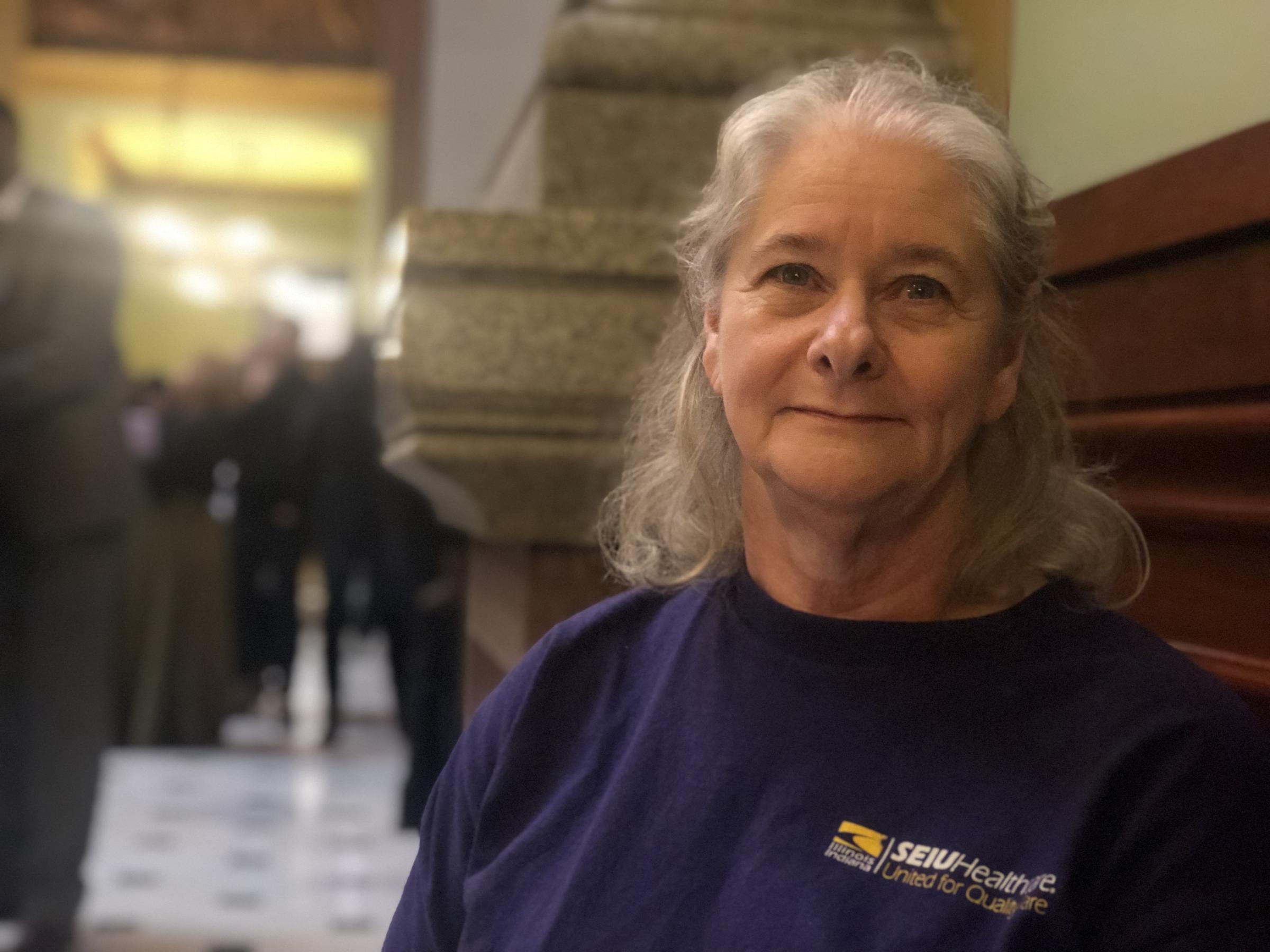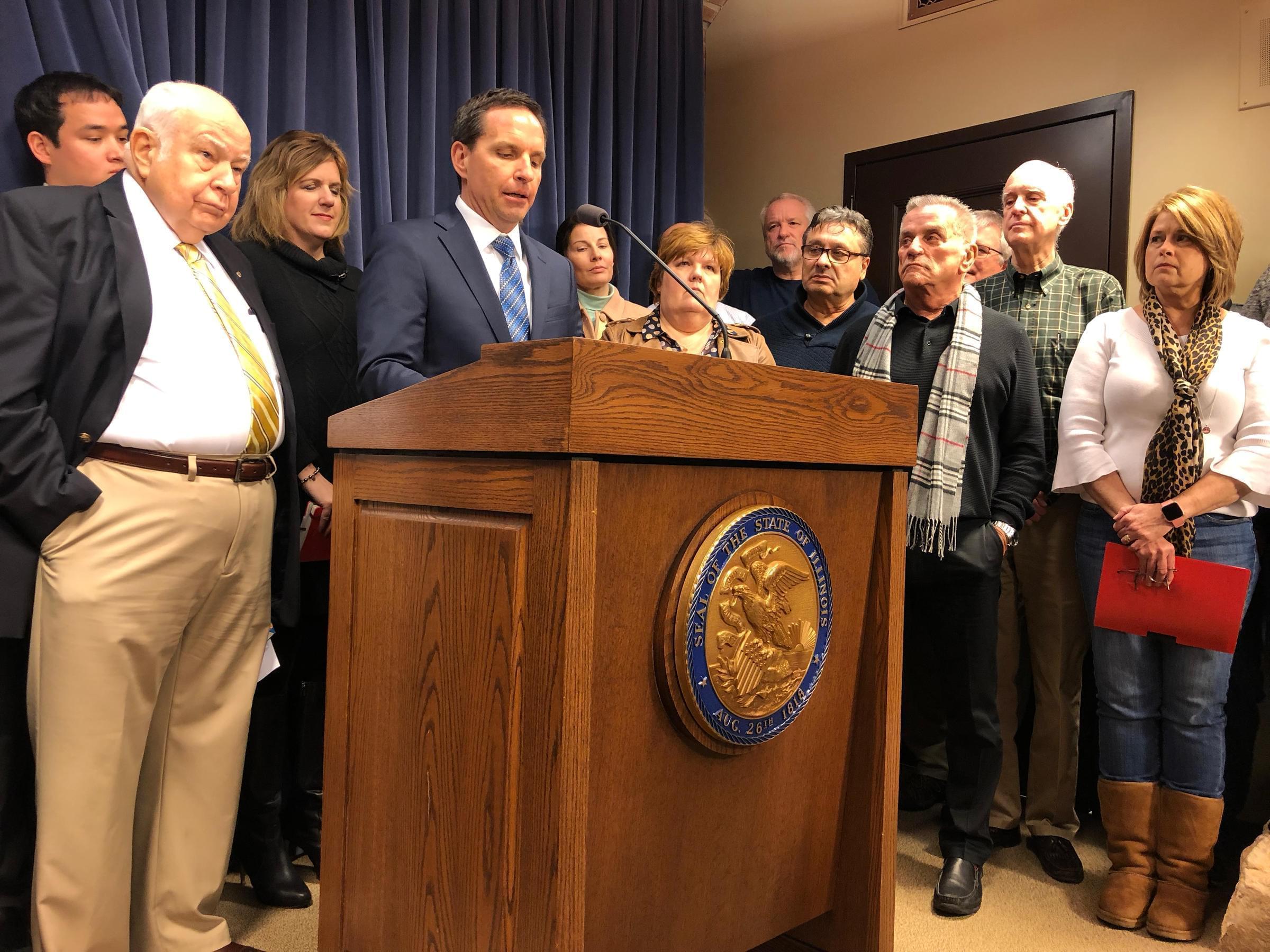Illnois House Approves Raise To Min. Wage; Gov. Pritzker Expected To Sign

Lawmakers pose with $15 minimum wage advocates after a House vote approved the increase on Feb. 14, 2019. Daisy Contreras/NPR Illinois
The Illinois House approved a $15 minimum wage plan Thursday that now heads to the governor’s desk. But, some are still unhappy with the fast-track approach.
It isn’t the first time a minimum wage measure has passed out of the legislature—a similar plan was approved in 2017 but then-Gov. Bruce Rauner vetoed it. The difference this time? J.B. Pritzker—a Democrat—is governor. He campaigned on the issue and has indicated he’ll sign it as soon as next week.
The state’s minimum wage has stayed at $8.25 an hour since 2010. Advocates for a higher minimum wage say the change was long overdue. The plan is to phase-in the increase over six years, starting next year on Jan. 1 when the minimum wage will go to $9.25 and $10 by July 1. Thereafter, a $1 increase per year until reaching $15 in 2025.
But several business owners say that could force them to close or move out of state. Some Republican lawmakers say there was no need to rush this through. They point to the governor’s inauguration remarks where he said he would work with both parties.
Democratic state Rep. Mike Halpin—of Rock Island in the Quad-Cities border-line, said he understands some businesses in his district might choose to move across the river to Iowa, where the minimum wage is currently a dollar lower than Illinois. “I don’t take those concerns lightly. But to be clear, companies don’t make that choice based on the minimum wage alone."
Halpin said other factors, like high property taxes, could be driving businesses away. He voted in favor of the plan.
State Rep. Thomas Bennett, a Gibson City Republican, said while he applauds the goal of helping give workers more money, he said he’s disappointed there was no attempt to consider business groups and their suggestion to pass a tiered increase based on geography and cost of living.
“There has been no real discussion, it is getting rammed through quickly. And my fear is that this bill is going to hurt the very people—the very people that we are trying to help today," he said.
State Rep. Will Guzzardi, a Democrat from Chicago and sponsor of the plan disagrees. He said stakeholders have been discussing the minimum wage since 2017 and approving an increase is the only way to help. “If we want to lift people out of poverty, we need to pay people a fair and decent wage, that respects the dignity of their work. That wage is no less than $15 an hour in any corner of Illinois," he said.

Virginia Grant is a personal assistant with the state's Division of Rehabilitation Services. She says she has pushed for an increase to the minimum wage since 2012, when the movement 'Fight for 15' went nation-wide.
For some, the minimum wage issue hit close to home. State Rep. Celina Villanueva, a Democrat from Chicago, recalls growing up in a household where her parents were minimum wage workers. "What we are talking about are human beings—people that deserve the respect and the dignity to spend time with their children, instead of having to work 20 hours a day to make ends meet.”
Still—opponents say they are anxious and have many questions still unanswered. Republican state Rep. Terri Bryant of Murphysboro worries about how much it will cost the state, especially the state’s nine public universities that were hit hard by the two-year budget impasse. "Don't you agree that we should be working to return those public universities to stable economic conditions?" she asked other lawmakers during debate. "That we should know the total financial impact to our institutions of higher education, once this bill is fully implemented?”

Business groups like the Illinois Retail Merchants Association proposed a regionalized minimum wage plan that would depend on cost of living by region. Several business owners expressed concerns that a state-wide increase could force them to shut their doors.
Gov. Pritzker said his office is well aware of what some of the costs could be—and those will be taken into consideration in his budget proposal next week.
Despite the political debate, healthcare workers earning a minimum wage like Virginia Grant of Charleston, said they're satisfied with the outcome after advocating for several years.
Grant said she has a message for those still on the fence:
“I would say—live on my income, walk a mile in my shoes, like the saying goes. Because if you had to struggle like I have, and all of my brothers and sisters in this field, it would change your mind.”

